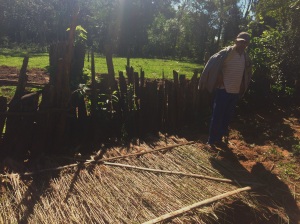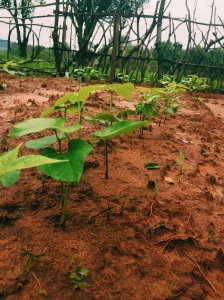Your Guaraní lesson for the day:
- (a)ve- I move
- (a)veve- I move repeatedly, I fly
- (a)po- I jump
- (a)popo- I jump repeatedly, I hop
- (a)mbopopo- I make jump repeatedly, I bounce
- (a)pu- I sound, ring
- (a)mbopu- I make sound, I play (an instrument)
- (a)mbopupu- I make sound repeatedly, I boil water
Óga Ita, Itapúa, Paraguay
Today is Día de San Antonio, who apparently is the patron saint of the few little communities in the area, thus making it a holiday. He is also the patron saint of animals. So we’re killing a pig in his honor. I’ll just assume that pigs were his least favorite of the animals and overlook the irony.
Holidays don’t particularly govern activity in rural Paraguay, mainly just food consumption. Yesterday was a nationwide holiday in honor of the Paz de Chaco (Peace of the Chaco), when Bolivia and Paraguay finally stopped fighting over a desolate landscape and got their act together, from what I understand (and then Paraguay just gave it away for free to the Mennonites). Despite the fact that the wonderful Peace Corps administration staff got to stay home from work, I was woken up by Lalo, clapping at my door at 7, to start work on seed beds for our vivero, or tree nursery. I pretended to have been up for awhile, mumbled some non-committal, incomprehensive Guaraní and stumbled around while making coffee (I had stayed up late reading, falsely believing that I could sleep in due to the federal holiday). Three hours later, we had at least 20,000 Yerba Mate seeds planted in two well-protected seed beds to hopefully grow and share amongst the community or sell to outside interest. This project has sparked a lot of interest in my host brothers and I’m hoping to also plant citrus and native tree seeds as well, to eventually start reforestry efforts in Óga Ita. We’ll see how these seed beds turn out, but it could be a start for a big community-wide project that both myself and the people are excited about.
Families still tend to gather on holidays, no matter how big or small the affair, and my sister Fermina came over from Joveré, Chara’s community, for lunch. After eating, we sat, gossiped about Chara, discussed how long it had been since Chara had visited her, suggested that maybe I mention this to Chara, and decided that Fermina should just take matters into her own hands and go visit Chara herself. Chara is her favorite topic with me, which is fine, because I’m the topic of conversation when she’s with Chara. Then she asked to see my garden. Now, here’s the thing: I have a very lovely garden space. It’s seven large raised beds surrounded by a nice fence I made of branches and partially shaded by a large Guatambu tree, but for some reason, the only thing I can get to grow is beans and two tomato plants that flowered with the promise of ripe, juicy, sweet tomatoes, but then decided that I was undeserving of such fruit. It’s been raining heavily lately and whatever the rain didn’t squash flat and bury, the ants promptly devoured. My garden is slightly embarrassing right now. But there I was, standing with my mom and Fermina, looking over the fence while I said “the carrots used to be there. And the Swiss chard was growing there. And I had cucumbers planted there. And at one point there was a jalepeño there. And I thought the lettuce had come up there. And it had looked like the cabbage might survive…” The suffix –kuri is added to verbs in Guarani to make them past tense and –kue can be added to a noun to mark that it once existed, but no longer does. I was using both a lot. Throughout this whole narrative, Fermina is just staring at the empty beds dubiously and my mother is just nodding her head slowly, as if she knew originally that my garden was headed towards impending doom. She always knows these things. It was embarrassing. And all she said was, “Ohhhh well you have work to do then, so we’ll leave now”. So much for a holiday.
Some may recall my tale of following cows around with a shovel and digging through my mom’s garden trash looking for corn husks and watermelon rinds. Six months later, I have some pretty beautiful compost and it’s the main addition to my garden renovation. Recently, my friend Spencer, who lives in Seattle, sent me a photo of a small container garden that he put together on his patio. I have never been more jealous, just based on the color of the soil in that photo. It was dark and rich and his plants looked happy. I look at mine and it’s marbled red and white with clay and sand and my plants look like they’re surviving, just not thriving. This new compost is a big deal for my garden and yet it’s taken me six months to get it. In the U.S., we have it easy. Anyone can garden and actually succeed and be good at it! You can go to big home and garden stores and pick up manure, compost, potting soil, peat, mulch, ready-to-plant seedlings, insecticide, herbicide, potassium, nitrogen, and phosphorus and take care of any garden issue or project in an hour! If there were a Home Depot in Obligado, it would be my second home. But instead I have to think differently to appease Fermina. I boil water as a soil treatment to kill bad bugs. I collect ash from my mom’s outdoor oven to deter ants. I wait six months for decent compost to form, which really has seemed like six months of a committed relationship. So much heartbreak and joy has never come from cohabitation with a box of cow poop and kitchen scraps. I love you, compost. Rohayhu.
I’ve embarked on take 2 of my garden. Chance’s garden: the remix. I’m hopeful that my beds will have more nutrients now and that the bugs will stay away for enough time that my plants can sprout and I can make an organic pesticide. And maybe Fermina will stop by on her way to help send a little piggy to that big sty in the sky this afternoon and see the work I’ve done. But really, it’s not about Fermina. All this work is for me to enjoy the literal fruits of my labor. I’d love to have something to put on the table this winter for myself and Moritz, other than beans. He’s a picky eater.

Abundio with the finished seed bed. The grass on top is to keep the soil humid and protect from the sun.

My brothers, Lalo on the right and Abundio on the left, working on a seed bed

At least I’ve got beans


